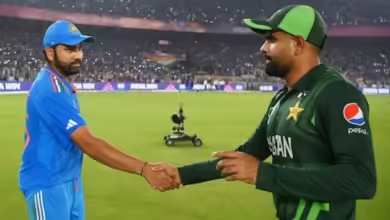Electoral Reforms and Political Reluctance

Often claims are made to prevent criminals from contesting elections, but in reality this is not possible.
Shivendra Rana
Often claims are made to prevent criminals from contesting elections, but in reality this is not possible. This is the reason that in 2019, eighty-two percent more MPs have criminal backgrounds than in 2004. It is not that our political parties are unaware of all these facts. But the solution of these problems is not in the priority of any leader or political party. The electoral reforms that have taken place so far have been possible due to the activism of the Supreme Court and the promptness of the Election Commission.
Suffrage is the basic element of democracy. Its real meaning is only when there is fairness in elections. Recently, the Supreme Court fined eight political parties for not complying with the Supreme Court order to make public the criminal details of their candidates in the Bihar Assembly elections. Commenting on this, the Supreme Court said that ‘the danger of criminalization of the political system is increasing. For its correctness persons with criminal background should not be allowed to become law makers.’
There should have been a serious debate on this issue from Parliament to the street in the country, but it was taken as a general decision. Our politicians are well versed in the art of diverting public attention from the core issues and debating on non-essential issues. The relationship between crime and elections is very old. In the seventies and eighties, when the influence of casteist politics started increasing, then leaders trying to emerge on the basis of casteism used criminals of their particular caste to loot booths, intimidate voters, kill candidates of opposition parties etc. . Then these criminals became the necessity of political parties and leaders.
These criminals also used their political connections to establish their parallel power. Then these criminals started to feel that when they can make someone win the election, they can also win themselves, this will also give them legal protection. Then in the nineties, these criminals themselves started playing in the Lok Sabha and assembly elections. Initially, regional parties gave him more support. There were two reasons for this. First, the rapid rise of casteist politics under the direct influence of socialism. In such a situation, criminals of a particular caste proved to be particularly beneficial in spreading the influence of these parties. What could not be done by speeches, promises, money distribution, famous personalities or film stars were easily done at gunpoint. When regional parties adopted this strategy, national parties also started recruiting anti-social elements by sweeping them. As a result, goons and dacoits started becoming ‘honorable’ through every political party.
Most amazing, is the right to contest elections from jail. If convicted people can contest elections, then all prisoners in the country should be given the right to vote. Till date no party has given any serious thought on this subject. Rather, the decision of the Supreme Court was opposed by all the Left and Right parties in one voice in the all-party meeting. The matter had reached to the encroachment of its powers by the judiciary. No one was ready to talk about the basic issue of preventing these criminals from going to Parliament and Vidhan Sabha. The parties posing these criminals have a simple argument that these cases are bogus and conspiracies of the opponents. In this way, with the passage of time, the influx of criminals in the temple of democracy increased.
Often claims are made to prevent criminals from contesting elections, but in reality this is not possible. This is the reason that 128 tainted candidates were successful in reaching the Parliament in the Fourteenth Lok Sabha of 2004. Out of these, eighty-eight honorable MPs were such that there were serious criminal cases registered against them like murder, attempt to murder or rape. In 2009, 162 (29.83 percent) MPs who were elected to the 15th Lok Sabha had criminal cases registered against them. Twenty-six percent more MPs with criminal background were elected in this Lok Sabha than in the fourteenth Lok Sabha. Of these, seventy-six hon’bles had criminal cases of serious nature registered against them. In the sixteenth Lok Sabha in 2014, 185 (34 per cent) of the total MPs had criminal cases registered against them. Of these, 112 had cases of serious nature against them. Out of the total MPs elected in the Seventeenth Lok Sabha of 2019, 233 have criminal cases registered against them. Of these, there are cases of serious nature against 159. That is, eighty-two percent more MPs have criminal backgrounds in 2019 than in 2004.
It is not that our political parties are unaware of all these facts. But the solution of these problems is not in the priority of any leader or political party. The electoral reforms that have taken place so far have been possible due to the activism of the Supreme Court and the promptness of the Election Commission. For example, in October 2018, the Election Commission made it mandatory for candidates to advertise their criminal details in television and newspapers at least three times during the entire election. At the same time, the commission had also clarified that the cost of these advertisements will also have to be borne by the candidates, as it comes under the category of ‘election expenses’. But the political parties of the country know very well the art of reversing these reforms. For example, in 2013, the Supreme Court upheld a Patna High Court order that held that a person who does not have the right to vote while in jail or in police custody is not an elector.
This increased the possibility of curbing the election of criminals. But political parties did not like this, so new provisions were added in the Representation of the People Act, 1951 to contest the Parliament or Assembly elections. The first provision in this was that even if the person’s name is recorded in the voter’s list, even if he is debarred from voting due to being in custody, then he cannot be debarred from contesting the election. The second provision was that an MP and a member of the Legislative Assembly shall be disqualified only if he is disqualified under this Act and not on any other ground. These criminals and their patron parties have made these constitutional provisions as their shield. Now some measures need to be taken immediately in the direction of electoral reforms. First, the minimum educational qualification for the candidates of Legislative Assembly and Lok Sabha should be graduation. Second, they should have experience in Panchayat and civic elections. Third, if a candidate or an MLA-MP is convicted by a court, the political party that gave him the ticket should be punished. Fourth, the election should be conducted entirely at the expense of the government. In 1998, the Inderjit Gupta Committee had considered it legally justified in the public interest.
Fifth, if false information is found in the election affidavit, the candidate should be banned for life and his party should also be fined, as the primary responsibility of that party was to know about his background before making him a candidate. Sixth, the facility of ‘Right to Recall’ should be provided to the public. Because without this the honorable public representatives are not going to improve. Seventh, effective implementation of NOTA, so that political parties improve the selection process of candidates. Also public participation in these reforms. At the time of making the constitution, suggestions were also sought from the public to make the process of the Constituent Assembly public, then what has happened today that only four-five hundred ‘honorable’ will decide the future of the population of more than one hundred and thirty crores.
.





